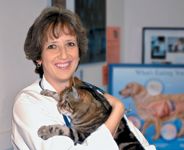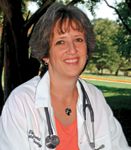An Interview with... Dr. Ellen N. Behrend
"Veterinarians need to direct their own profession," says this professor and endocrinologist. "If we do not take responsibility for how veterinary medicine is practiced, we may find out that we are no longer making the decisions."
Ellen N. Behrend, VMD, MS, PhD, DACVIM (small animal internal medicine), is an associate professor in the Department of Clinical Sciences, College of Veterinary Medicine, Auburn University. She has received numerous awards, including the NIH Clinical Investigator Award, the Daniels Award for Excellence in Small Animal Endocrinology, and the Deanâs Award for Excellence in Teaching.
Who was your most memorable patient?
The first day of my internship, I saw Sugar, an old Westie with diabetes mellitus, hyperadrenocorticism, and pancreatitis. Since I was a budding endocrinologist, this was a great case for me! After a long hospital stay and many complications, Sugar finally went home to dedicated owners. From Sugar, I learned what a pleasure and challenge veterinary medicine can be, that compassion and communication with owners are at least half the battle, and that if I am in over my head, I should ask for help—there is always someone who knows more than I do.

Dr. Behrend and Houdini, a retired blood donor for the clinic at Auburn University.
What would you advise a new graduate?
For their professional life, I would advise new graduates to follow their dreams, to never lose sight of the reason they wanted to become veterinarians, and to make every day exciting and new by constantly challenging themselves to learn. In general, I would also remind new graduates that there is more to life than veterinary medicine, and they need to spend time on the nonveterinary pursuits that are important to them.
What are some of your nonveterinary pursuits?
My family (I have 4-year-old twins—a boy and a girl—and a very supportive husband), reading, cooking, and, in the fall, Auburn football!
What book are you reading now?
Eat, Pray, Love: One Woman's Search for Everything Across Italy, India, and Indonesia by Elizabeth Gilbert.
What is your favorite film?
It's a Wonderful Life. I find it inspiring that a person can make such a profound difference simply by doing what he or she believes in.
Are you a cat person or a dog person?
I enjoy dogs, but I am completely a cat person. I have always preferred cats, even before I owned one and knew the true pleasure!
What part of your work do you enjoy most?
I enjoy the constant learning and challenge of being in an academic environment. I am glad that I can teach, do research, and see patients. Working with students is wonderful—they challenge you to be the best you can be.
What do you consider the greatest threat to the profession?
New graduates do not want to own their own practices, and corporate veterinary medicine is filling the void. Veterinarians need to direct their own profession—if we do not take responsibility for how veterinary medicine is practiced, we may find that we are no longer making the decisions. Similarly, veterinarians need to be aware of issues impacting our profession, such as bioterrorism and public health, and need to become involved so that we are making the judgments that affect us and the species we care for.
What changes in veterinary medicine do you hope will occur in the next 100 years?
I hope we find a way to ensure that all animals receive the veterinary care they need without cost being an issue. I also hope we solve the overpopulation problem.
What is on the cutting edge of endocrinology?
Advances are being made everywhere in endocrinology, but the most exciting to me are those in the treatment and management of diabetes mellitus and the treatment of canine Cushing's disease.
What makes a good veterinarian?
Good veterinarians are dedicated to their field (whichever part of veterinary medicine they choose), stay current on the latest developments in that field, and practice their craft with enthusiasm, passion, and compassion.
